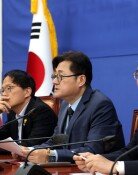Overseas missions` capacity needs to be reinforced for N.K. defector issue
Overseas missions` capacity needs to be reinforced for N.K. defector issue
Posted June. 05, 2013 06:53,
The South Korean embassy in Laos, which is under fire for failing to block nine North Korean children from being repatriated to North Korea, has five diplomats on duty, including Ambassador Lee Geon-tae. Having been deployed to the post in January 2010, Lee passed his three-year term there. Under Lee are a counselor for political affairs, who is in charge of development assistance and resources, and a third secretary (Grade 7 officer) in charge of general affairs and consul affairs. A first secretary (Grade 4 officer) in charge of North Korean defectors is also responsible for culture and public relations.
The South Korean embassy in Laos is not a duty station as dangerous and tough as those in Iraq and Afghanistan. Laos is an area where is preferred by diplomats who have been deployed in an advanced country when they work at a rotational duty station. If classified into good and bad duty stations, Laos is closer to the latter, but it is safer and better than regions in conflict or African countries. But situation in Laos has changed as North Korean defectors began moving into the Southeast Asian country en masse.
After the Vietnam route was shut off in 2006 due to purging of security officers in Vietnam, a formerly major defection route for North Koreans, Laos emerged as an alternative path for their defection. Hundreds of North Koreans have entered South Korea via Laos, but only one diplomat is dealing with North Korean defectors there. Moreover, there is no single staff from the South Korean Unification Ministry at the embassy. Even the official deployed at the embassy from a South Korean intelligence agency failed to monitor signs concerning North Korea.
The mission primarily deserves criticism. But amid lack of staff and resources, excessive workload at the mission is apt to causing mistakes. It is unfair to only hold responsible those who were caught for committing errors while playing the game of mock bomb delivery. If Laos is considered an important place, staff and budget should be significantly increased. If diplomats alone are not sufficient to fill the gap, opening positions responsible for managing North Korean defectors to private sector professionals, who are armed with sense of mandate and professionalism, can also be deliberated. The Foreign Affairs Ministry and the National Assembly are advised to closely examine the Laos incident, and provide working conditions that enable local missions to properly fulfill their duty.
This applies to countries beyond Laos. South Korea should reinforce capacity of its missions in all the routes, through which North Korean defectors could seek to enter the South, including China, Russia, Mongolia, Tibet, Myanmar and Vietnam. It is time for South Korea to end the practice of mending fence only after horses run away. If caught in Laos, a North Korean defector should pay 300 U.S. dollars in ransom. There were reportedly cases where North Koreans were repatriated because they did not have some 300 dollars. This is a shame on South Korea, one of the 10 global economic powers. South Korea should make an investment as much as required, if North Korean defectors are worth being protected, and if those in charge still fail to properly carry out their responsibilities, they should be held accountable.







